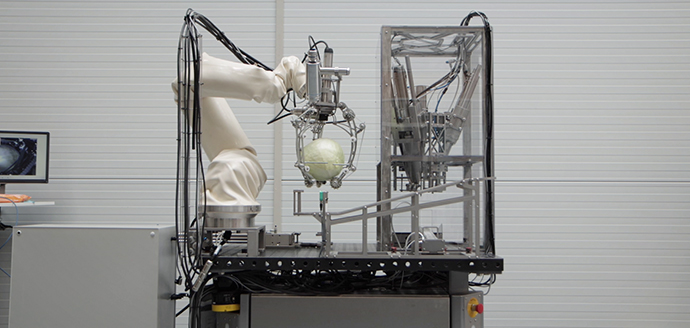20 tons of cabbage for spring rolls in the hands of a robot
8 April 2021
The number of rolling heads of cabbages at Denmark's spring roll manufacturer exceeds most people’s wildest imagination.
Somewhere between 15 and 20 tons of cabbage are handled every day at Daloon. They are all turned, weighed, and assessed in the hands of the factory's employees and then end up as spring rolls, which are served throughout Scandinavia and several places in northern Europe.
– We produce about a million spring rolls every day, where we of course use a lot of raw materials - including a lot of cabbage. Today, our process is relatively manual. There is a lot of one-sided and repetitive work around the handling of these cabbages, which we really want to solve, says Peter Madsen, who is Technical Manager at Daloon.
Therefore, the system integrator Technicon, together with the Danish Technological Institute (DTI), has developed a prototype of a robot solution under the auspices of the EU project agROBOfood.
The solution will in the long run make the handling of cabbage more productive, reduce food waste and remove the hard tasks from the employees.

– Heads of cabbages are a natural product. They vary in size, diameter, and design, and therefore it is difficult to make a machine that handles these cabbages the same way. And that is where the robot solution is a good idea, Peter Madsen states.
This is not the first robot solution on the floor of the Daloon production. In fact, as many as 34 robots are at the danish spring roll manufacturer - most of them, however, are used as "pick and place" robots.
– But exactly this process with cabbage we have not automated yet. We have had incredible difficulty finding the right solution for it, because the product varies as much as it does, says Peter Madsen.
Handling fragile cabbage
Collaborative robots, the so-called cobots, spare employees from tedious work tasks, they are flexible, and they can handle delicate items.
And that is why it is precisely this kind of robot - combined with cameras and artificial intelligence - that can take care of Daloon's cabbage.
– What we have built consists of three main elements. One is a robot skin, which gets this collaborative robot into food production. Then there is a grabber that can handle vegetables of different sizes. And finally, there is a vision system that helps with quality control and orientation of these vegetables, says Mads Eskelund Kristensen, who is Technical Project Manager at Technicon.
![Cabbage [...] vary in size, diameter, and design, and therefore it is difficult to make a machine that handles these cabbages the same way.](/_/media/81652%5FCitatDaloonUK.jpg)
And Senior Consultant at DTI Carsten Panch Isaksen elaborates:
– The key to this solution is the way we have used cameras and artificial intelligence to find the head and the stick of the cabbage. Today the system does not know what sizes the cabbages are and therefore they are all drilled in the same way. With the new system, we can calculate how much of the core needs to be drilled and thus reduce waste.
The future of food industry
In the food industry, it is important for quality, among other things, that all phases of processing and handling take place uniformly, carefully, and hygienically - all tasks that robots are ideal to handle.
– The fact that we now have a skin for the collaborative robots from Universal Robots, means that we can get it into the food industry. I see great potential in that, says Mads Eskelund Kristensen.
And Peter Madsen from Daloon agrees:
– DTI and Technicon have really come up with some good input here, and it has given us all a boost. This has allowed us to handle the food much more accurately.
AgROBOfood - funded by the EU's Horizon 2020 program - aims to move robots into the food industry, among other things by providing financial support through open project calls for the development work itself.
Do you have questions about agROBOfood or robot technology?
Then contact Carsten Panch Isaksen from DTI at capi@dti.dk or 72 20 18 02.